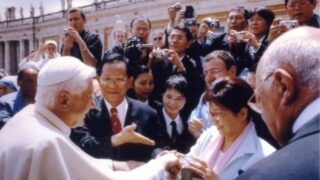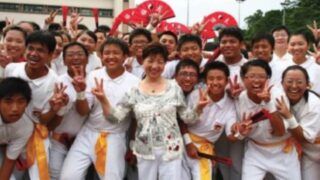Augustine’s words in his famous “The City of God” brilliantly epitomize the abyss of a state where social justice fails. Is this what Tai Ji Men is suffering since a quarter of a century?
by Marco Respinti*
*A paper presented as the conclusion of the webinar “In Search of Justice for Tai Ji Men,” co-organized by CESNUR and Human Rights Without Frontiers on February 20, 2022, World Day of Social Justice.


Today is the World Day of Social Justice, established by the United Nations in 2009.
Social justice is a key concept for a human and humane civilization, as well as one frequently misunderstood, or even positively twisted.
Marie-Jeanne “Manon” Roland de la Platière (1754–1793), universally known simply as “Madame Roland,” was a French aristocrat. In 1793, during the French Revolution (1789–1799), she was sent to the gallows by the Terror rulers of the country, like so many aristocrats and clergymen, as well as peasants and common people. Moments before her last moments, Madame Roland famously said: “O Liberté, que de crimes on commit en ton nom!”, “Oh Freedom, what crimes are committed in your name!”


In the two hundred years elapsed since that time, how many times all of us could have said as well: “O Justice Sociale, que de crimes on commit en ton nom!”, “Oh Social Justice, what crimes are committed in your name!” This is a sentence worth translating not only in English, but in all the languages of the world, whose number scholars calculate in more than 6,500.
The “Social Justice” formula has been in fact often used by regimes that promised Heaven on Earth and in fact offered to their citizens only Hell. “Social Justice” has been waved as a flag by ideologues and ideocrats who have punished innocent citizens for crimes they never committed.
But the concept of social justice is indeed pivotal. In fact, it combines justice with the social dimension of the human being, making a sort of “synolon,” as Aristotle (384–322 BCE) would have said, out of the two. And the social dimension of the human being, as again Aristotle reminds us, points at one of the key aspects of human nature.
In brief, the formula “social justice,” properly understood, and not left to tyrants, petty or big, means that there is no such a thing as a society, conceived as the common house for women and men, if there is no guarantee of justice. And, on the other side, it means that justice can only find its home within a human and humane society.
Properly exploring the depth of these concepts could easily take hours, maybe days. We don’t have this time today. So, instead of summarizing, or mechanically repeating, the brilliant remarks of the preceding scholars and the touching testimonies of our friends in the Tai Ji Men community, I wish today to conclude this webinar by meditating on a passage from one of the fathers of Western civilization, an admirable saint for the Catholic and Orthodox and Protestants Christians, a master philosopher, and a great man, Augustine of Hippo (354–430).


One of his most famous and brilliant books is called “De Civitate Dei,” or “The City of God.” In the fourth of its 22 books, the fourth chapter includes words that remain today as heavy as stones. “Justice being taken away, wrote Augustine, then, what are kingdoms but great robberies? For what are robberies themselves, but little kingdoms? The band itself is made up of men; it is ruled by the authority of a prince, it is knit together by the pact of the confederacy; the booty is divided by the law agreed on. If, by the admittance of abandoned men, this evil increases to such a degree that it holds places, fixes abodes, takes possession of cities, and subdues peoples, it assumes the more plainly the name of a kingdom, because the reality is now manifestly conferred on it, not by the removal of covetousness, but by the addition of impunity. Indeed, that was an apt and true reply which was given to Alexander the Great [356–323 BCE] by a pirate who had been seized. For when that king had asked the man what he meant by keeping hostile possession of the sea, he answered with bold pride, what you mean by seizing the whole earth; but because I do it with a petty ship, I am called a robber, while you who does it with a great fleet are styled emperor” [I quote from the translation of Marcus Dods (1834–1909) published in “From Nicene and Post-Nicene Fathers,” First Series, Vol. 2, edited by Philip Schaff (1819–1893) (Buffalo, NY: Christian Literature Publishing Co., 1887), subsequently revised and edited for New Advent by Kevin Knight.]
Augustine’s unforgiving judgment resonates high today, maybe higher today than in the philosopher’s own times, and especially in the face of the 25-years incredible persecution of the pacific, law-abiding Tai Ji Men movement.
In fact, to paraphrase Augustine’s words, if justice is taken away in Taiwan for Taiwanese law-abiding citizens who pursue their religious freedom and spiritual well-being in the Tai Ji Men movement, what is left of Taiwan’s democracy at the end of the day?
If petty pirates in the Taiwanese bureaucracy think they are the Alexander the Greats of South-East Asia, how can Taiwan claim to be different in quality from its neighboring countries that violate religious liberty and human rights?


If an arrogant bureaucrat is regarded as a servant of the public good only because he robs aboard of a larger ship than common thieves do, what is really social justice?
Do not, please, get me wrong. I am an admirer of Taiwan for historical, political, and cultural reasons, and I am ready to say that all of us here today support Taiwan as well. I strongly believe that Taiwan itself has suffered and suffers great international injustice, as it is prevented to take its rightful place in the international organizations. I do commend Taiwan’s and the Taiwanese people’s struggle for liberty, democracy and civility. I do think that Taipei is a happy oasis in a yellow sea of troubles, and I am honored to have been featured in a webinar hold in the Legislative Yuan of the Republic of China on the danger posed by Taiwan’s powerful neighbor. I have visited that beautiful country as a loyal friend, and I want to visit it again as a convinced supporter. And it is precisely for these reasons that, personally and professionally, I am bewildered when I see how democratic Taiwan treats the patriotic Taiwanese citizens of Tai Ji Men.
I said this time and again, and I want to repeat it on the World Day of Social Justice. I believe that the Taiwan’s government misdeeds against Tai Ji Men are due to the wrongdoings perpetrated by some rogue bureaucrats. I believe it is a giant misinterpretation. I want to believe it.
I am deadly serious. And I want the Taiwan democratic government to be deadly serious with me too, telling me that I am right, that the misunderstandings will be corrected, and that Tai Ji Men may find peace and social justice at last. Happy Lunar New Year to the government of Taiwan and its civil servants, to the citizens of Taiwan, including the victims of injustice, and to Tai Ji Men.









